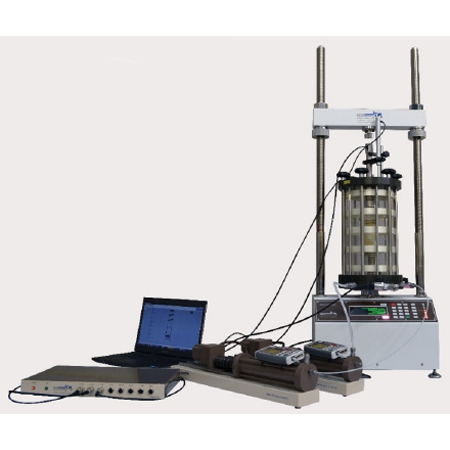The GDS Quasi Dynamic Triaxial Automated
System is based exclusively on the static GDSTAS triaxial
system as used in commercial laboratories and research
institutes. The GDS 50kN load frame has the unique
capability that it can run dynamically at frequencies up to
0.1Hz inherently, when combined with a dynamic logging
system instead of the static logging system supplied with
a GDSTAS as standard. The system is capable of cyclic
displacement and cyclic load tests up to a frequency of
0.1Hz. The Quasi Dynamic System uniquely fills a gap in
the market for medium speed cyclic testing, for half the cost
of a typical, full capability, dynamic system.
Key Features:
Up to 0.1Hz cyclic testing under
displacement or load control
Upgrade is possible from a GDSTAS static
system (so long as it is using the v2 LF50 GDS load frame)
Realistic liquefaction testing on granular
soils
Cost efficient
Benefits
Cyclic testing 30x faster than can be
achieved with a standard static GDSTAS system for minimal additional cost.
Dynamic testing up to 0.1Hz, can be
achieved for approximately 50% of the cost of a full dynamic system, or
upgraded for 20% of the cost of a typical dynamic system.
Liquefaction testing on free-draining soils
is known to not be rate dependent, therefore cyclic testing on these soils is
possible in a standard static triaxial system (so long as it has cyclic control
that GDSLAB can provide as standard). However, by running these tests at 0.1Hz
rather than the typical one cycle every 5 minutes with a static system, a
typical test 1000 cycles long that would take 3.5 days in a static system,
would take less than 3 hours in the Quasi Dynamic system.
Half the cost of a typical dynamic system
(even pneumatically controlled dynamic systems which have been shown to
generally only work up to 0.1Hz ). For users who need to work up to 0.1Hz, this
is a very economical system.

 Enquiry:hkmarketing@epc.com.hk
Enquiry:hkmarketing@epc.com.hk 









